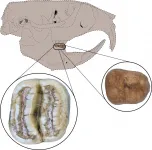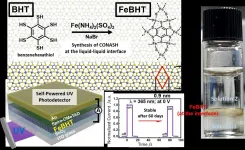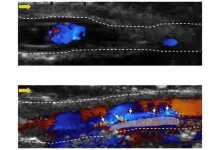Emotion, cooperation and locomotion crucial from an early age
Researchers at the UNIGE have found that emotion knowledge, cooperative social behavior and locomotor activity are three key skills for promoting numerical learning in children aged 3 to 6
2021-07-15
(Press-News.org) What are the fundamental skills that young children need to develop at the start of school for future academic success? While a large body of research shows strong links between cognitive skills (attention, memory, etc.) and academic skills on the one hand, and emotional skills on the other, in students from primary school to university, few studies have explored these links in children aged 3 to 6 in a school context. Researchers from the University of Geneva (UNIGE) and Valais University of Teacher Education, Switzerland (HEP-VS), in collaboration with teachers from Savoie in France and their pedagogical advisor, examined the links between emotion knowledge, cooperation, locomotor activity and numerical skills in 706 pupils aged 3 to 6. The results, to be read in the journal Scientific Reports, show for the first time that emotion knowledge, cooperative social behaviour and locomotor activity are interrelated and associated with numerical skills. These results are in line with the political and scientific consensus on the importance of social-emotional skills in early schooling and suggest that locomotor activity should be added to these fundamental skills.
A growing number of studies are examining the fundamental abilities that prepare children for school and that are particularly crucial for their future academic success. "Among these abilities, 'emotion knowledge' contributes significantly and is a long-term predictor of social behaviour and academic success", says Edouard Gentaz, professor in the Department of Psychology at the Faculty of Psychology and Educational Sciences (FPSE) of the UNIGE and the last author of this study. On the other hand, few studies have examined the links between socio-emotional and academic skills in preschool children. "To fill this gap, we joined forces with the HEP-VS and a team of teachers from Savoie in France and their pedagogical advisor to examine how emotion knowledge, social behaviour and locomotor activity are associated and linked to the numerical skills in 706 pupils aged between 3 and 6 years old", continues the Geneva-based researcher. Unlike most research that generally examines school results through reading tests, this study focuses on numerical learning, the performance of which is less correlated with parents' socio-economic level than language skills.
Original tests adapted to the preschool age and educational context
To examine the links between the four variables studied, age-appropriate tests were developed in close collaboration with 33 volunteer teachers, who participated in an interactive workshop in which they were trained to set up, perform and evaluate the different tests in a standardised manner. Thus, emotion knowledge was assessed through two emotion comprehension tasks. The first measured the recognition of the primary emotions of anger, fear, joy and sadness as well as a neutral facial expression and the second measured the understanding of the external causes underlying these emotions in others. This second task was subdivided into two different subtasks: the teacher successively presented the student with five drawing scenarios illustrated by a picture of a character with a blank face facing a particular situation (e.g., 'This boy has just received a present for his birthday') and then asked the student to indicate, among five illustrations of facial expressions, the one that corresponded to what the character felt in each situation, first by pointing to it (non-verbal responses) and then by naming it. The assessment of mathematical skills included three numerical tests. For example, the first test sought to assess whether students understood that the cardinal of a collection does not change when the spatial arrangement or nature of its elements is modified: the teacher placed a photograph in front of the student showing four collections of objects (two of which were composed of the same number of elements) and asked the student to indicate which collection contained the largest number of objects, which contained the fewest, and which two collections contained the same number.
Working closely with the teachers and their advisor, the psychologists developed observation grids to assess the locomotor activity and social behaviour of the pupils. For locomotor activity, the grid created made it possible to rate the children's performance on an agility course consisting of various installations on the ground and in the air. As for social behaviour, the grid developed made it possible to evaluate the children's reactions and attitudes during the practice of two different team games (one with a ball and the other without) observed by the teachers.
Key skills to promote numerical learning
The results of this study reveal that emotion knowledge, locomotor activity and social behaviour are interdependent and associated with pupils' numerical skills from the age of 3 to 6 years. "Indeed, specific statistical analyses (regression and mediation) show that high scores on tests assessing emotion knowledge, locomotor activity and social behaviour predict better mathematical performance in these students", notes Thalia Cavadini, researcher in the Department of Psychology at FAPSE and first author of the study. "Thus, our results are in line with the scientific consensus on the importance of social-emotional skills at the beginning of schooling and suggest that locomotor activity should be added to these fundamental skills", she concludes. Furthermore, this study is the first to show that emotional, social and locomotor skills promote school learning in toddlers.
INFORMATION:
[Attachments] See images for this press release:

ELSE PRESS RELEASES FROM THIS DATE:
2021-07-15
Contamination of urban lakes, rivers and surface water by human waste is creating pools of 'superbugs' in Low- and Middle-Income Countries (LMIC) - but improving access to clean water, sanitation and sewerage infrastructure could help to protect people's health, a new study reveals.
Researchers studied bodies of water in urban and rural sites in three areas of Bangladesh - Mymensingh, Shariatpur and Dhaka. They found more antibiotic resistant faecal coliforms in urban surface water compared to rural settings, consistent with reports of such bacteria in rivers across Asia.
Publishing their findings in mSystems today, researchers from the University of Birmingham and the International Centre for Diarrhoeal Disease Research, Bangladesh call for further research to quantify the drivers ...
2021-07-15
COVID-19 NEWS: CAN DIETARY SUPPLEMENTS HELP THE IMMUNE SYSTEM FIGHT CORONAVIRUS INFECTION?
Media Contact: Patrick Smith, pjsmith88@jhmi.edu
Johns Hopkins Medicine gastroenterologist Gerard Mullin, M.D., and a team of co-authors published an article May 11, 2021, in Advances in Experimental Medicine and Biology that details the scientific rationale and possible benefits -- as well as possible drawbacks -- of several dietary supplements currently in clinical trials related to COVID-19 treatment.
According to business analysts, the U.S. nutritional supplement industry grew as much as 14.5% in 2020, due in large part to the COVID-19 pandemic.
Mullin, associate professor of medicine at the Johns Hopkins University ...
2021-07-15
GAINESVILLE, Fla. --- Two fossil teeth from a distant relative of North American gophers have scientists rethinking how some mammals reached the Caribbean Islands.
The teeth, excavated in northwest Puerto Rico, belong to a previously unknown rodent genus and species, now named Caribeomys merzeraudi. About the size of a mouse, C. merzeraudi is the Caribbean's smallest known rodent and one of the region's oldest, dating back about 29 million years.
It also represents the first discovery of a Caribbean rodent from a North American lineage, a finding that complicates an idea ...
2021-07-15
A new study by the University of Malta and Staffordshire University highlights an urgent need for change in the curriculum and demonstrates how introducing longer, more frequent and more physically intense PE lessons can significantly improve children's weight and overall health.
Malta currently has one of the highest rates of obesity worldwide with 40% of primary and 42.6% of secondary school children being overweight or obese.
The World Health Organization (WHO) recommends that children engage in at least 60 minutes of age-appropriate moderate-to-vigorous physical activity (MVPA) daily, however ...
2021-07-15
New Rochelle, NY, July 14, 2021-Firsthand reports from nurses in correctional facilities detail the challenges they faced during the COVID-19 pandemic. These firsthand accounts are reported in a special issue on correctional nursing in the Journal of Correctional Health Care. Click here (https://www.liebertpub.com/toc/jchc/27/2) to read the issue now.
Karen Monsen, PhD, RN, School of Nursing, University of Minnesota, and colleagues present the Omaha System COVID-19 Response Guidelines, which provide evidence-based pandemic response interventions used in correctional ...
2021-07-15
Converting light to electricity effectively has been one of the persistent goals of scientists in the field of optoelectronics. While improving the conversion efficiency is a challenge, several other requirements also need to be met. For instance, the material must conduct electricity well, have a short response time to changes in input (light intensity), and, most importantly, be stable under long-term exposure.
Lately, scientists have been fascinated with "coordination nanosheets" (CONASHs), that are organic-inorganic hybrid nanomaterials in which organic molecules are bonded to metal atoms in a 2D network. The interest in CONASHs stems mainly from their ability to absorb light at multiple wavelength ranges and convert ...
2021-07-15
Indiana Jones hates snakes. And he's certainly not alone. The fear of snakes is so common it even has its own name: ophidiophobia.
Kibret Mequanint doesn't particularly like the slithery reptiles either (he actually hates them too) but the Western University bioengineer and his international collaborators have found a novel use for snake venom: a body tissue 'super glue' that can stop life-threatening bleeding in seconds.
Over the past 20 years, Mequanint has developed a number of biomaterials-based medical devices and therapeutic technologies - some of which are either licensed to medical companies or are in the advanced stage of preclinical testing.
His latest collaborative research discovery ...
2021-07-15
Penn State College of Engineering researchers set out to develop technology capable of localizing and imaging blood clots in deep veins. Turns out their work may not only identify blood clots, but it may also be able to treat them.
The team, led by Scott Medina, assistant professor of biomedical engineering, published its results in Advance Healthcare Materials.
"Deep vein thrombosis is the formation of blood clots in deep veins, typically in a person's legs," said Medina. "It's a life-threatening blood clotting condition that, if left unaddressed, can cause deadly pulmonary embolisms -- when the clot travels to the lungs and blocks an artery. To manage DVT, and prevent these life-threating complications, it's critical to be able to rapidly detect, monitor and treat it."
The ...
2021-07-15
The research seeks to understand what drives decisions in data analyses and the process through which academics test a hypothesis by comparing the analyses of different researchers who tested the same hypotheses on the same dataset. Analysts reported radically different analyses and dispersed empirical outcomes, including, in some cases, significant effects in opposite directions from each other. Decisions about variable operationalizations explained the lack of consistency in results beyond statistical choices (i.e., which analysis or covariates to use).
"Our findings illustrate the importance of analytical choices and how different statistical methods can lead to different conclusions," says Martin Schweinsberg. ...
2021-07-15
Patients with advanced chronic kidney disease (CKD) typically suffer from impaired bone quality and quantity, with a non-vertebral fracture risk which is 4-to 6-fold higher than the fracture risk of matched controls. However, despite their high risk of fragility fractures, the vast majority of patients with chronic CKD stages 4 to 5D, are not receiving osteoporosis therapy.
A newly published review by the International Osteoporosis Foundation (IOF) and European Renal Association-European Dialysis and Transplant Association (ERA-EDTA) CKD-MBD working group now provides concise recommendations, with a clear management algorithm, to support clinicians' knowledge and confidence in managing ...
LAST 30 PRESS RELEASES:
[Press-News.org] Emotion, cooperation and locomotion crucial from an early age
Researchers at the UNIGE have found that emotion knowledge, cooperative social behavior and locomotor activity are three key skills for promoting numerical learning in children aged 3 to 6





